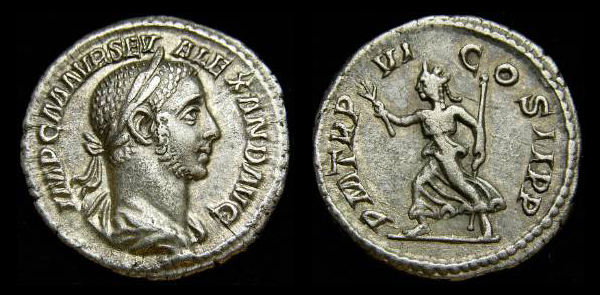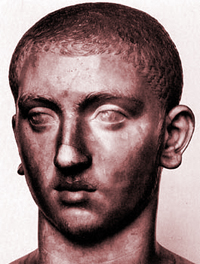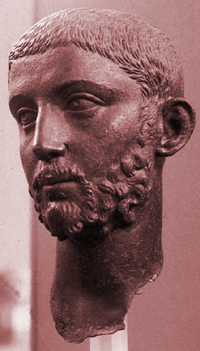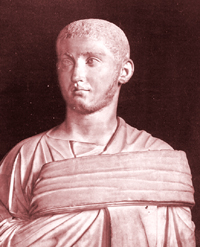
Denarius - IMP SEVERUS ALEXANDER
(RSC 67) - Rome Mint
Marcus Aurelius Severus Alexander
Born: A.D. 208
Emperor: A.D. 222-235
Obverse: Portrait laureate and draped bust right - IMP C M AVR SEV ALEXAND AVG
Reverse: Pax running left holding olive branch and scepter - P M TR P VI COS II P P
|
Inscriptions: IMP(erator) C(aesar) M(arcus) AVR(elius) SEV(erus) ALEXAND(er) AVG(ustus) / P(ontifex) M(aximus) TR(ibune) P(otestate) VI (Sixth Year) COS (Consul) II (Second Year) P(ater) P(atriae) Emperor Caesar Marcus Aurelius Severus Alexander Augustus / High Priest, Tribune of the People for the Sixth Year, Consul for the Second Year and Father of His Country Born Marcus Julius Gessius Bassianus Alexianus during the reign of Septimius Severus, he was the the son of Gessius Marcianus, an imperial procurator of equestrian status and Julia Mamaea, niece of the then empress, Julia Domna, wife of Septimius Severus. He was born into wealth with close ties to the imperial family and raised, for the most part, away from the public eye receiving the best education his families wealth could provide. He was introduced to public life upon the death of Caracalla when he and his mother are declared enemies of the state by the short lived emperor Macrinus, former praetorian prefect proclaimed emperor in 217 and thought to be involved in the successful plot to kill Caracalla. Macrinus was dispatched by Elagabalus who became emperor and restored his cousins good name. As Elagabalus descended into a life of excess, debauchery, cruelty, and self gratification, those around him became more and more desperate for an alternative and young Alexander seemed a likely choice. Without an heir and at the prompting of his grandmother Elagabalus reluctantly adopted his cousin (renamed Alexander) not long after receiving his toga virilus, and appointed him Caesar in 221. Soon stories arose that he was the illegitimate child of Caracalla thus linking him to the deified soldier emperor Septimus Severus. This garnered him support in the ranks of the military who were desperate to rid themselves of the embarrassment that was Elagabalus' rule. Less than a year after being made Caesar, Elagabalus was murdered and Severus Alexander was proclaim emperor by the army on March 13, 222, he was not yet 14 years old. Although Alexander was emperor, it could rightfully be said that at this time the empire was guided by a woman, his mother Julia Mamaea. She, along with trusted and able administers, guided the young emperor and helped him to reestablish the dignity of the emperor that had been so tainted during the reign of Elagabalus. Alexander is described as an amiable 'good' person who worked to return dignity to his office, restore some of the senate's prestige and functions, and bring stability to chaotic civil government that had become rife with corruption. He did much to improve the condition of the people and empire. Besides his mother, His advisers were men like the famous jurist Ulpian, the historian Dio Cassius and a select board of sixteen senators; a municipal council of fourteen assisted the urban prefect in administering the affairs of the fourteen districts of Rome. The madness and extravagance of elegabalus' court were eliminated, taxes were lightened, and literature, art and science were encouraged. In matters of religion Alexander was open minded honoring such diverse figures as Orpheus, Abraham, Apollonius of Tyana, and Jesus. He also gave attention to various building projects. The the last of the 11 great aqueducts, the Aqua Alexandrina, was put into service and he rebuilt the thermae Neronianae in the Campus Martius. For all his achievements in the civil arena, the empire needed a strong military leader as well. Alexander was inexperienced having never served in the army in any capacity and he was forced to rely heavily on his generals when war broke out in the east against the Persians who looked to expand their empire to its former size leading to inevitable clashes with Rome. Alexander along with his mother and staff traveled to the east with additional troops drawn from the German frontier looking to stop the Persian advances. Alexander was not a general but his presence gave additional weight to the empire's policy. After some initial losses the roman military managed to prevail in stemming the tide and keeping the Persian spread in check and Alexander returned to Rome and celebrated a triumph in 233. The following year the situation in the west had worsened. The Germanic tribes had seized on the opportunity left by the withdraw of troops to the eastern provinces to cross the Rhine and attack forts, towns and cause general havoc in Roman occupied lands. In 234, Alexander and his mother moved to Moguntiacum (Mainz), the capital of Upper Germany, and with the return of troops from the east managed to bring order to the province and began planning a major offensive building a bridge to take the battle across the Rhine to German territories. For reasons unknown, Alexander decided against the offensive and instead decided to negotiate a peace which included payments to the offending tribes. This action outraged the roman troops who saw this as dishonorable and a sign of weakness unbefitting a roman emperor. Of the action the historian Herodian says "in their opinion Alexander showed no honorable intention to pursue the war and preferred a life of ease, when he should have marched out to punish the Germans for their previous insolence". The soldiers mutinied in 235 killing both Alexander and his mother placing the hardened soldier Maximinus on the throne. The death of Alexander is commonly considered the end of the principate system first introduced by Augustus and the beginning of the 'crisis of the third century' which would see a weakening of the empire under the rule of military emperors facing growing threats from both enemies of Rome and Usurpers. Severus Alexander died roughly half way through his 26th year and had reigned for exactly half his life. A child when chance brought him to power and with sound advice and good intentions he brought dignity back to the principate and the state and in civic matters proved a tolerant and amiable emperor. In the end, he proved inadequate for the challenges the empire faced in the early third century. Military experience and ability was now the prime attribute required to meet the threats to Rome's safety in the east and the north and in this he was lacking and it cost him his life. |



